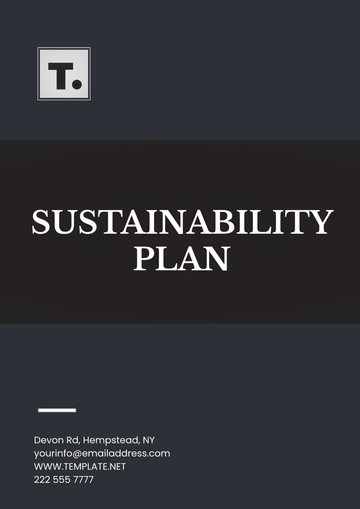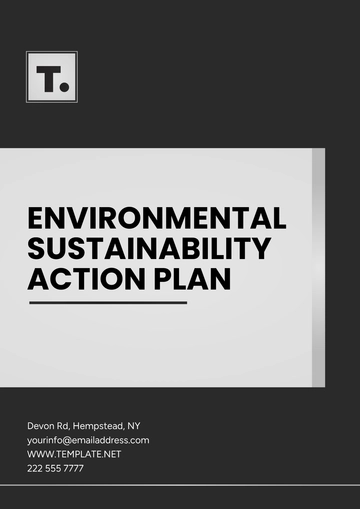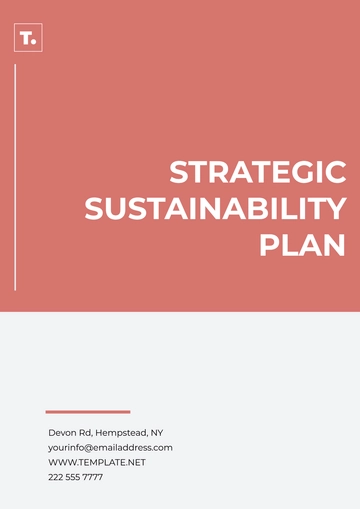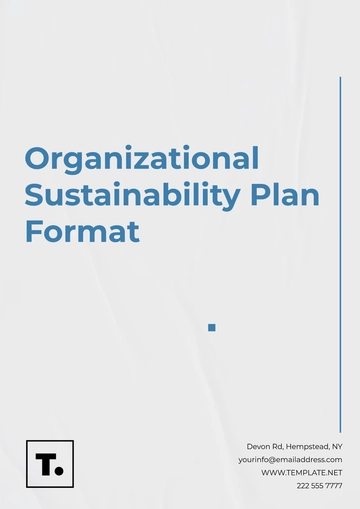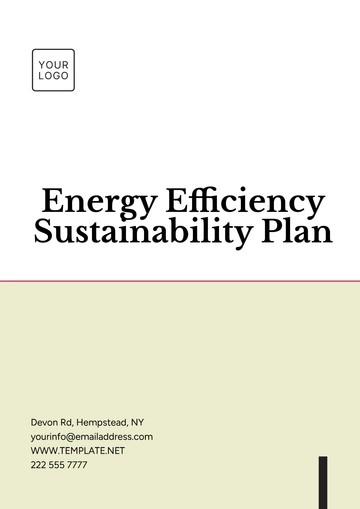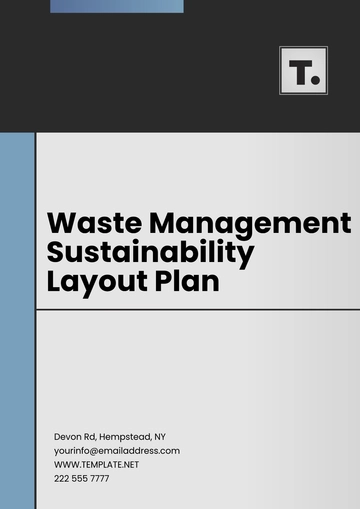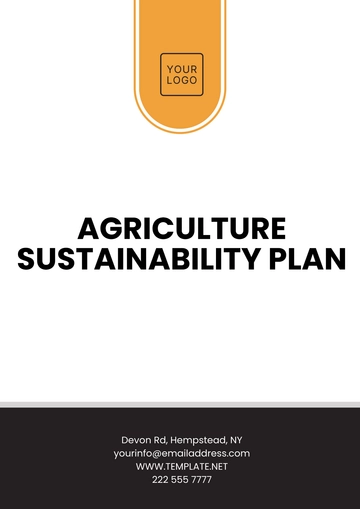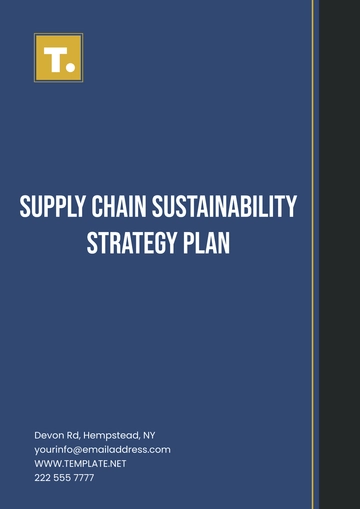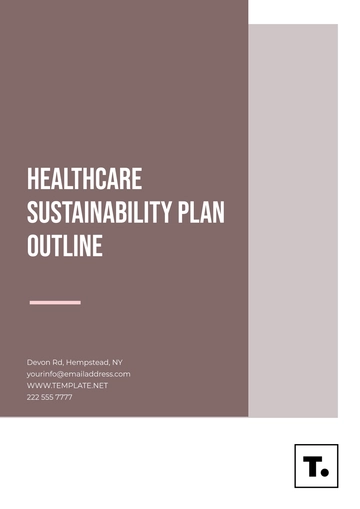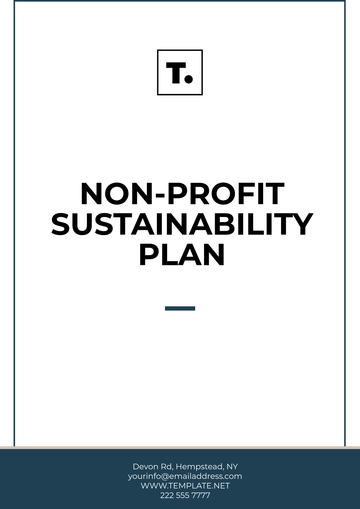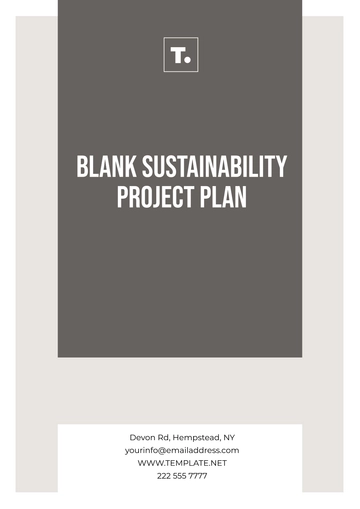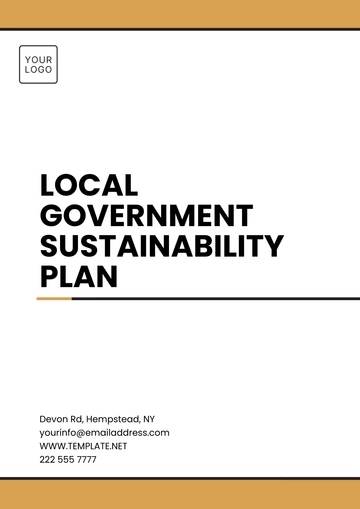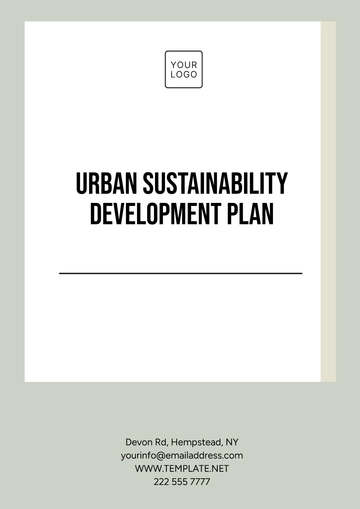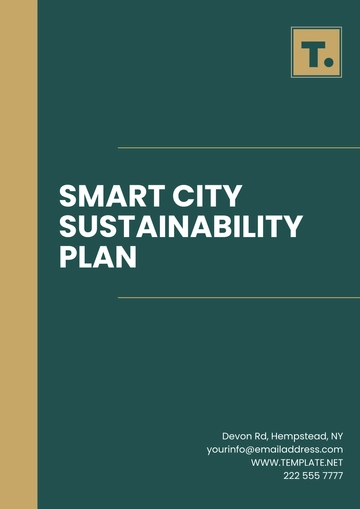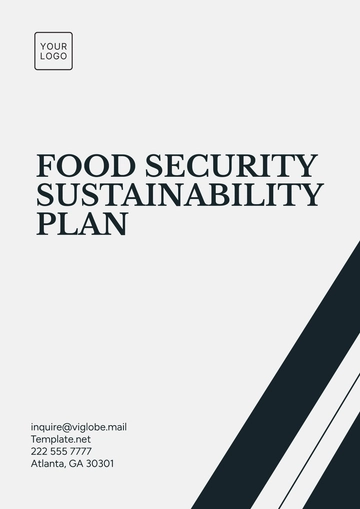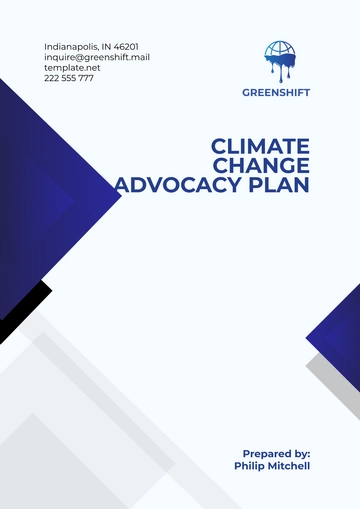Free Agriculture Sustainability Plan
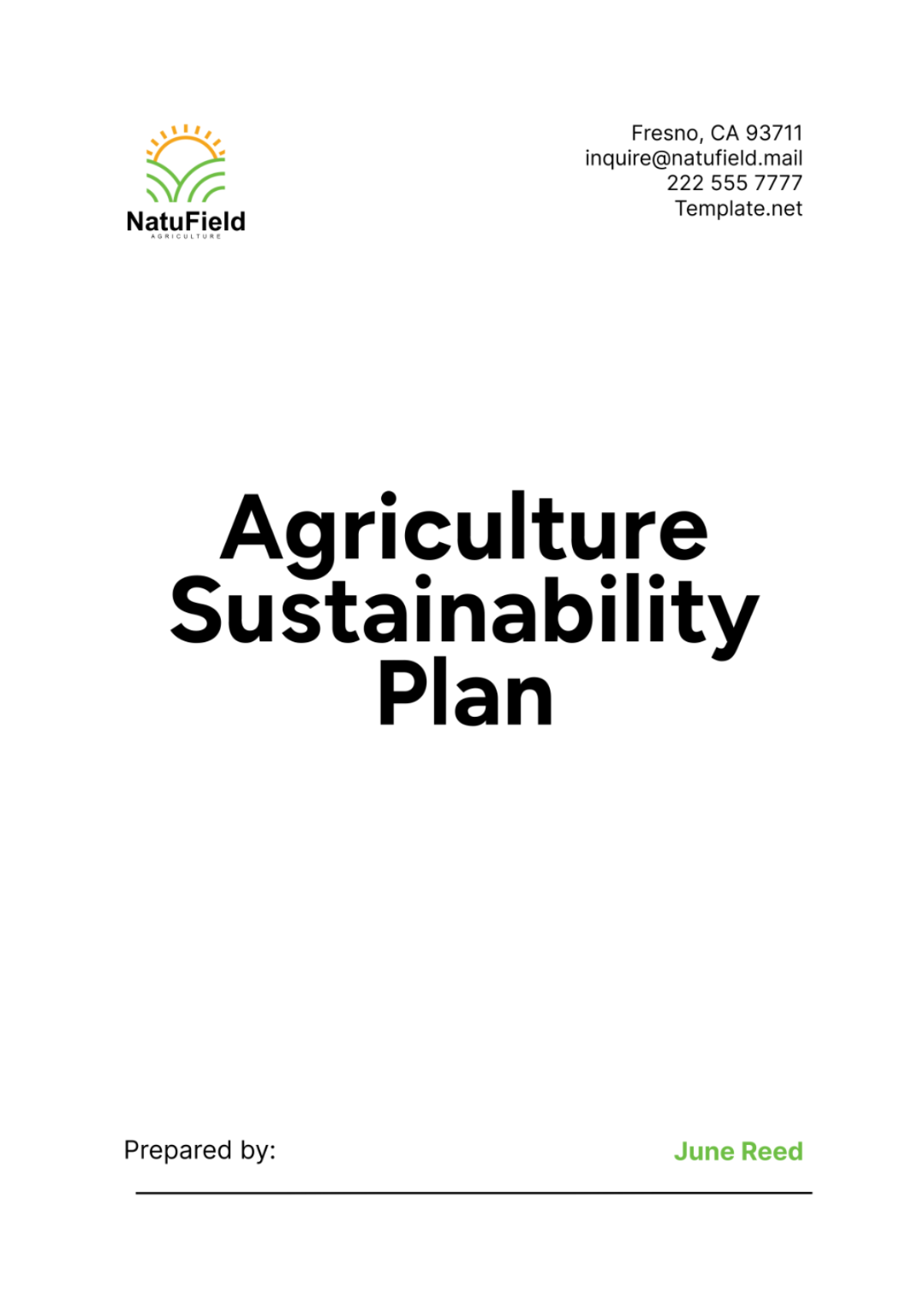
1. Introduction
To ensure the long-term viability of agricultural practices, it is crucial to prioritize sustainability. Sustainable agriculture aims to meet the needs of the present without compromising the ability of future generations to meet their own needs. This involves adopting practices that are economically viable, environmentally sound, and socially responsible. [Your Company Name] is committed to implementing and promoting sustainable practices that enhance productivity while preserving the natural resources upon which agriculture depends.
This plan outlines key strategies and action steps to achieve our sustainability goals. We will focus on integrating advanced technologies, improving resource efficiency, and fostering a culture of sustainability among our employees and stakeholders. By leveraging innovations in precision agriculture, water management, and soil health, we aim to reduce our environmental footprint and enhance the resilience of our farming systems.
Furthermore, our approach includes engaging with local communities and ensuring fair labor practices to support social sustainability. We recognize that the well-being of our workforce and the surrounding communities is integral to the success of our sustainability initiatives. Through education, collaboration, and transparent reporting, we aim to build trust and drive continuous improvement in our sustainability efforts. By adhering to US laws and standards, we will ensure our practices are compliant and contribute to the broader goal of sustainable agriculture.
2. Objectives
The objectives of [Your Company Name]'s Agriculture Sustainability Plan are designed to ensure a balanced approach to economic viability, environmental protection, and social responsibility. By focusing on these key areas, we aim to create a sustainable agricultural model that benefits all stakeholders involved.
The following table outlines our primary objectives and their corresponding descriptions:
Objective | Description |
|---|---|
Economic Sustainability | Increase profitability and market access for farmers through efficient resource management and innovative practices. |
Environmental Protection | Minimize environmental impact by reducing waste, promoting soil health, and conserving water and biodiversity. |
Social Responsibility | Improve the livelihood of farming communities by ensuring fair labor practices and fostering community resilience. |
3. Key Strategies
To achieve the objectives outlined in our Agriculture Sustainability Plan, [Your Company Name] has developed a series of targeted strategies. These strategies are designed to foster sustainable agricultural practices that enhance economic viability, protect the environment, and support social responsibility. By implementing these key strategies, we aim to create a resilient and sustainable farming system that can adapt to changing conditions and meet the needs of future generations.
The following strategies are integral to our sustainability efforts and will guide our actions in promoting sustainable agriculture:
Adoption of Integrated Pest Management (IPM): Encourage the use of biological control methods and reduced reliance on chemical pesticides.
Promotion of Organic Farming: Support the transition to organic farming practices that avoid synthetic inputs and promote biodiversity.
Water Conservation Techniques: Implement advanced irrigation systems and water-efficient practices to conserve water resources.
Soil Health Improvement: Use crop rotation, cover cropping, and organic amendments to enhance soil fertility and structure.
Renewable Energy Integration: Incorporate renewable energy sources such as solar and wind to reduce the carbon footprint of farming operations.
Waste Reduction and Recycling: Encourage the reduction, reuse, and recycling of agricultural waste materials.
4. Implementation Steps
To successfully achieve our sustainability objectives, [Your Company Name] has outlined a clear and structured implementation process. This process includes a series of steps designed to ensure the effective adoption and integration of sustainable practices within our agricultural operations.
The following table details the key implementation steps, their descriptions, and the associated timelines:
Step | Description | Timeline |
|---|---|---|
Assessment | Conduct a baseline assessment of current practices and identify areas for improvement. | 0-3 months |
Planning | Develop detailed action plans and allocate resources for implementation. | 3-6 months |
Training | Provide training and support to farmers on sustainable practices and new technologies. | 6-12 months |
Implementation | Execute the planned activities and monitor progress. | 12-24 months |
Evaluation | Assess outcomes and make necessary adjustments to the plan. | 24-36 months |
The table outlines the implementation steps for [Your Company Name]'s sustainability plan, detailing the process over a 36-month period. It begins with a baseline assessment to identify improvement areas (0-3 months), followed by developing action plans (3-6 months). Training for farmers on sustainable practices occurs next (6-12 months), then the execution of planned activities (12-24 months). Finally, outcomes are evaluated, and adjustments are made (24-36 months).
5. Monitoring and Evaluation
Regular monitoring and evaluation are essential to ensure the success of [Your Company Name]'s sustainability plan. By establishing a robust framework for tracking progress, we can identify areas of improvement, celebrate successes, and make informed decisions to enhance our sustainability efforts. This process involves setting clear key performance indicators (KPIs), regularly collecting and analyzing data, and adjusting strategies based on findings.
Key Performance Indicators (KPIs)
To effectively measure progress, we will establish the following KPIs:
Reduction in Pesticide and Chemical Fertilizer Use
Aims to decrease reliance on synthetic pesticides and fertilizers. We will track the quantity of pesticides and chemical fertilizers used annually and compare these figures with baseline data to assess reductions. The target is to achieve a 20% reduction in the use of synthetic pesticides and fertilizers within five years.
Improvement in Soil Health Metrics
Seeks to enhance soil fertility, structure, and biodiversity. We will monitor soil organic matter content, pH levels, nutrient availability, and microbial activity through regular soil testing. The target is to increase soil organic matter by 10% and improve soil health metrics within three years.
Increase in Water Use Efficiency
Aims to optimize water usage to conserve resources and improve crop yields. We will track water usage per unit of crop produced and assess the efficiency of irrigation systems. The target is to improve water use efficiency by 15% within three years through advanced irrigation techniques and water management practices.
Adoption Rates of Sustainable Practices Among Farmers
Focuses on encouraging the widespread adoption of sustainable farming practices. We will conduct surveys and collect data on the number of farmers implementing practices such as crop rotation, cover cropping, organic farming, and integrated pest management. The target is to achieve a 50% adoption rate of at least one sustainable practice among participating farmers within five years.
Economic Benefits Realized by Farming Communities
Aims to enhance the economic well-being of farming communities through sustainable practices. We will assess changes in income, profitability, and market access for farmers using financial records and surveys. The target is to increase the average income of participating farmers by 15% within five years.
6. Conclusion
Adopting sustainable agricultural practices is vital for the future of farming. By integrating economic viability, environmental stewardship, and social responsibility, we can ensure the longevity and productivity of our agricultural systems. This plan provides a clear roadmap for achieving these goals, outlining specific objectives, strategies, and implementation steps that guide our efforts. Through regular monitoring and evaluation, we can track our progress, make necessary adjustments, and continuously improve our practices. The commitment to sustainability will not only protect our natural resources but also enhance the economic stability of our farming communities.
Collaboration is key to the success of this sustainability plan. By working together with farmers, agronomists, local communities, and industry partners, we can foster a culture of innovation and resilience. [Your Company Name] is dedicated to supporting farmers in adopting sustainable practices, providing the necessary training and resources to ensure success. As we implement this plan, we remain flexible and responsive to feedback, making improvements as needed to achieve our sustainability objectives. Ultimately, creating a more resilient and sustainable agricultural system benefits everyone, ensuring a healthier environment and a more prosperous future for farming communities.
- 100% Customizable, free editor
- Access 1 Million+ Templates, photo’s & graphics
- Download or share as a template
- Click and replace photos, graphics, text, backgrounds
- Resize, crop, AI write & more
- Access advanced editor
Promote eco-friendly practices with the Agriculture Sustainability Plan Template from Template.net. This fully customizable and editable template is perfect for outlining your sustainability strategies. Easily editable in our Ai Editor Tool, you can tailor it to your specific needs, ensuring a comprehensive and professional plan for sustainable agricultural practices.
You may also like
- Finance Plan
- Construction Plan
- Sales Plan
- Development Plan
- Career Plan
- Budget Plan
- HR Plan
- Education Plan
- Transition Plan
- Work Plan
- Training Plan
- Communication Plan
- Operation Plan
- Health And Safety Plan
- Strategy Plan
- Professional Development Plan
- Advertising Plan
- Risk Management Plan
- Restaurant Plan
- School Plan
- Nursing Home Patient Care Plan
- Nursing Care Plan
- Plan Event
- Startup Plan
- Social Media Plan
- Staffing Plan
- Annual Plan
- Content Plan
- Payment Plan
- Implementation Plan
- Hotel Plan
- Workout Plan
- Accounting Plan
- Campaign Plan
- Essay Plan
- 30 60 90 Day Plan
- Research Plan
- Recruitment Plan
- 90 Day Plan
- Quarterly Plan
- Emergency Plan
- 5 Year Plan
- Gym Plan
- Personal Plan
- IT and Software Plan
- Treatment Plan
- Real Estate Plan
- Law Firm Plan
- Healthcare Plan
- Improvement Plan
- Media Plan
- 5 Year Business Plan
- Learning Plan
- Marketing Campaign Plan
- Travel Agency Plan
- Cleaning Services Plan
- Interior Design Plan
- Performance Plan
- PR Plan
- Birth Plan
- Life Plan
- SEO Plan
- Disaster Recovery Plan
- Continuity Plan
- Launch Plan
- Legal Plan
- Behavior Plan
- Performance Improvement Plan
- Salon Plan
- Security Plan
- Security Management Plan
- Employee Development Plan
- Quality Plan
- Service Improvement Plan
- Growth Plan
- Incident Response Plan
- Basketball Plan
- Emergency Action Plan
- Product Launch Plan
- Spa Plan
- Employee Training Plan
- Data Analysis Plan
- Employee Action Plan
- Territory Plan
- Audit Plan
- Classroom Plan
- Activity Plan
- Parenting Plan
- Care Plan
- Project Execution Plan
- Exercise Plan
- Internship Plan
- Software Development Plan
- Continuous Improvement Plan
- Leave Plan
- 90 Day Sales Plan
- Advertising Agency Plan
- Employee Transition Plan
- Smart Action Plan
- Workplace Safety Plan
- Behavior Change Plan
- Contingency Plan
- Continuity of Operations Plan
- Health Plan
- Quality Control Plan
- Self Plan
- Sports Development Plan
- Change Management Plan
- Ecommerce Plan
- Personal Financial Plan
- Process Improvement Plan
- 30-60-90 Day Sales Plan
- Crisis Management Plan
- Engagement Plan
- Execution Plan
- Pandemic Plan
- Quality Assurance Plan
- Service Continuity Plan
- Agile Project Plan
- Fundraising Plan
- Job Transition Plan
- Asset Maintenance Plan
- Maintenance Plan
- Software Test Plan
- Staff Training and Development Plan
- 3 Year Plan
- Brand Activation Plan
- Release Plan
- Resource Plan
- Risk Mitigation Plan
- Teacher Plan
- 30 60 90 Day Plan for New Manager
- Food Safety Plan
- Food Truck Plan
- Hiring Plan
- Quality Management Plan
- Wellness Plan
- Behavior Intervention Plan
- Bonus Plan
- Investment Plan
- Maternity Leave Plan
- Pandemic Response Plan
- Succession Planning
- Coaching Plan
- Configuration Management Plan
- Remote Work Plan
- Self Care Plan
- Teaching Plan
- 100-Day Plan
- HACCP Plan
- Student Plan
- Sustainability Plan
- 30 60 90 Day Plan for Interview
- Access Plan
- Site Specific Safety Plan
